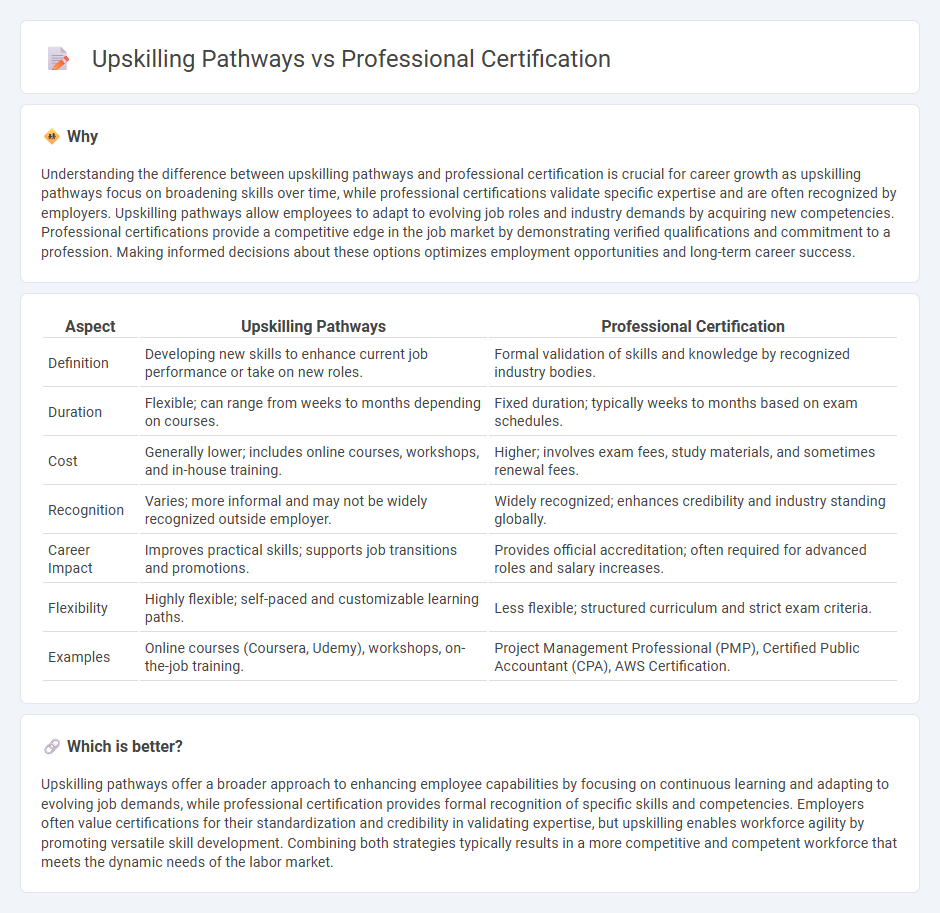
Upskilling pathways offer continuous learning opportunities tailored to evolving job market demands, enhancing skill sets through practical experiences and flexible training programs. Professional certification validates expertise with standardized assessments, boosting credibility and often improving career advancement prospects. Explore how both approaches can strategically elevate your career development.
Why it is important
Understanding the difference between upskilling pathways and professional certification is crucial for career growth as upskilling pathways focus on broadening skills over time, while professional certifications validate specific expertise and are often recognized by employers. Upskilling pathways allow employees to adapt to evolving job roles and industry demands by acquiring new competencies. Professional certifications provide a competitive edge in the job market by demonstrating verified qualifications and commitment to a profession. Making informed decisions about these options optimizes employment opportunities and long-term career success.
Comparison Table
| Aspect | Upskilling Pathways | Professional Certification |
|---|---|---|
| Definition | Developing new skills to enhance current job performance or take on new roles. | Formal validation of skills and knowledge by recognized industry bodies. |
| Duration | Flexible; can range from weeks to months depending on courses. | Fixed duration; typically weeks to months based on exam schedules. |
| Cost | Generally lower; includes online courses, workshops, and in-house training. | Higher; involves exam fees, study materials, and sometimes renewal fees. |
| Recognition | Varies; more informal and may not be widely recognized outside employer. | Widely recognized; enhances credibility and industry standing globally. |
| Career Impact | Improves practical skills; supports job transitions and promotions. | Provides official accreditation; often required for advanced roles and salary increases. |
| Flexibility | Highly flexible; self-paced and customizable learning paths. | Less flexible; structured curriculum and strict exam criteria. |
| Examples | Online courses (Coursera, Udemy), workshops, on-the-job training. | Project Management Professional (PMP), Certified Public Accountant (CPA), AWS Certification. |
Which is better?
Upskilling pathways offer a broader approach to enhancing employee capabilities by focusing on continuous learning and adapting to evolving job demands, while professional certification provides formal recognition of specific skills and competencies. Employers often value certifications for their standardization and credibility in validating expertise, but upskilling enables workforce agility by promoting versatile skill development. Combining both strategies typically results in a more competitive and competent workforce that meets the dynamic needs of the labor market.
Connection
Upskilling pathways enhance employee competencies through targeted training programs that align with industry standards and emerging job requirements. Professional certification validates these newly acquired skills, serving as a benchmark for employers to assess candidate qualifications and career advancement readiness. Together, they create a structured framework that boosts workforce adaptability and increases employability in competitive job markets.
Key Terms
Credentialing
Professional certification validates industry-specific skills through standardized exams, providing credible proof of expertise for career advancement. Upskilling pathways, while broader, encompass continuous learning methods such as workshops and online courses aimed at enhancing overall competencies. Explore how credentialing shapes career growth by visiting our detailed guide.
Skill Development
Professional certification validates specific skills and knowledge through standardized assessments, enhancing credibility in specialized fields such as IT, healthcare, or finance. Upskilling pathways involve continuous learning and training programs that broaden skill sets, adapting to evolving industry demands and technologies. Explore more to understand how targeted certifications and dynamic upskilling can accelerate your career growth.
Career Advancement
Professional certification validates specific skills and knowledge through standardized exams, enhancing credibility in targeted industries. Upskilling pathways involve continuous learning and skill development to adapt to evolving job market demands and broaden career opportunities. Explore more to understand which approach aligns best with your career advancement goals.
Source and External Links
What Is a Professional Certification? - BestColleges.com - A professional certification validates a specific set of skills and knowledge in a particular field, available across various industries like education, healthcare, business, and IT, and is an investment aligned with career goals and industry recognition.
Professional certification - Wikipedia - Professional certification is a voluntary credential usually awarded by professional societies or institutes (distinct from licenses issued by state agencies) and involves an assessment based on industry knowledge leading to a time-limited credential.
10 In-Demand Career Certifications (And How To Achieve Them) - Indeed - Popular professional certifications include project management (CAPM and PMP), with specific eligibility criteria, exam requirements, and associated fees detailed for career advancement in management roles.
 dowidth.com
dowidth.com